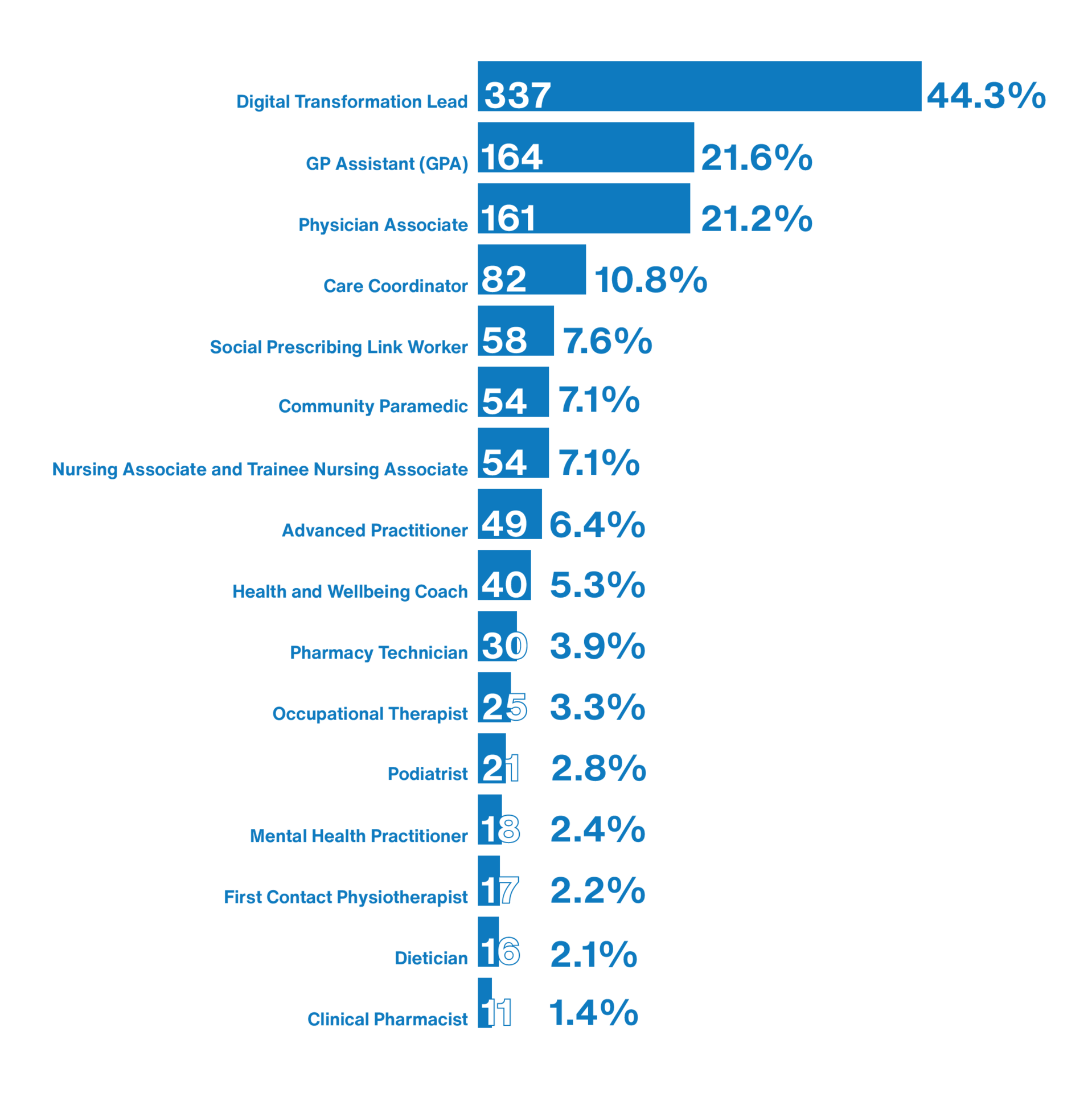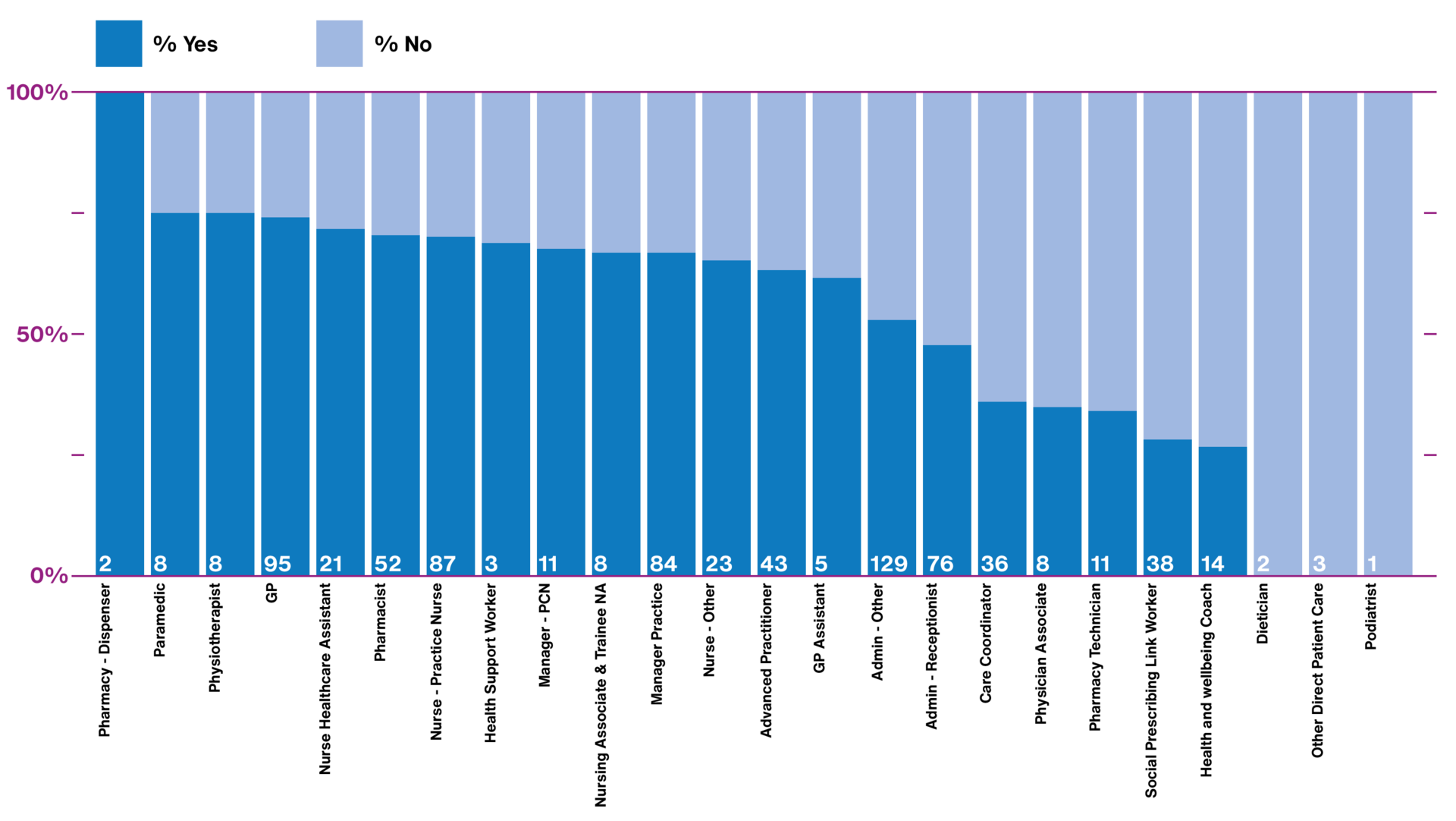Primary Care Training Needs Analysis 2023 - You Said, We Did! What else have we learned?
You Said, We Did! What else have we learned?
As we mentioned in our previous post, last year, we conducted our Primary Care Training Needs Analysis (TNA) 2023 in March to help shape the professional development opportunities we would provide you over 2023-24. We conduct this survey to ensure our offers are tailored and relevant to your current training needs.
As well as giving us an insight in to the topics you would like to see covered by future training and events the survey helps us to gain a clearer picture of the Primary Care workforce's other considerations and needs.
These include:
Caring responsibilities
46.6% of respondents have caring responsibilities. We recognise the importance of balancing work commitments with caring commitments. For example, we have organised 90% of our events so they don’t clash with school pick-up time. Where we have hosted day long events, e.g. the Notts Primary Care Conference 2023, we ensured that important information was presented before 15.00 to account for colleagues who may need to leave early.
This is just one example of caring responsibilities. We would love to hear from different experiences and situations, and how we can best cater our offers to be accessible and inclusive to all. Please email us on alliance.hub1@nhs.net.
Educators and Clinical Supervisors
15.4% of respondents were Educators and/or Clinical Supervisors. In free-text comments, we asked what refresher update courses would be beneficial for ongoing professional development in these roles. Here are the top themes:
Training need themes
Clinical Supervision and Assessment
Delivered
Clinical Supervision training
At the Primary Care Conference, we ran a session on how to get the best out of your nursing team through restorative clinical supervision
Planning
2x F2F SSSA sessions planned for 2024
Teaching and assessment skills (Inc. developing resources)
Created clinical supervision Padlet resource
Supporting students (inc. guidance, motivational interviewing)
Add in motivational interviewing event
Piloted NCGPA pharmacy student placement toolkit and will develop with feedback
2X Webinars ‘Introduction to role of a practice nurse’ planned for Student nurses and those considering a move to practice nursing. Includes application and interview tips.
Since April, 18 have also undertaken our self-directed standards for student supervision and assessment (SSSA) training to become practice supervisors and/or assessors and joined this community. We now have 51 supervisors/assessors in total on our Notts SSSA trained register. We use this to identify with GP Practices can take on student placements, which we help coordinate with local universities.
189 people have attended our MPSU Clinical Supervision Training sessions and 6 attended our Clinical Supervision Support Meetings. Both these are run frequently throughout the year and provides the foundations required to become a competent clinical supervisor, alongside ongoing network and professional development support.
“The theory was interesting, but hearing what went well/not well with previous supervision was very helpful. The most important thing I learned was how to tailor your supervision to meet the needs of the trainee.”
Delegate from a Clinical Supervision Support Meeting
Which of the ARRS roles do you not understand?
There are currently 16 roles than can be funded through the Additional Roles Reimbursement Scheme (ARRS). The aim from introducing these roles is to improve patient access to general practice, expand capacity and support the delivery of new services and offers available in Primary Care.
The chart below highlights the percentage of respondents who do not understand each role.

21.3% stated that they understood all the ARRS roles in Primary Care. Of those who didn’t, the chart shows that we need to prioritise awareness of the role and responsibilities of:
Digital, Business and Transformation Managers
GP Assistants
Physician Associates
At the Primary Care Conference we ran an ARRS ‘round the world’ session where we had 12 of the 16 ARRS roles represented. They went around five different tables to tell them about their role, skills, benefits to practices, routes into the role, tips for recruiting, and their personal experiences / successes so far in Primary Care. Our Advanced Practice Lead then went on to run a session on different development and funding streams available to upskill staff into Advanced Practice.
In September 2023, we launched our ARRS Ambassadors Project and have ambassador representatives (spanning the whole of Nottingham and Nottinghamshire) for:
Advanced Practitioners
Digital, Business and Transformation Managers
First Contact Practitioners (Dietitians, Occupational Therapists, Paramedics, Physiotherapists, Podiatrists)
Health and Wellbeing Coaches
Pharmacy Technicians
Physician Associates
Social Prescribing Link Workers
We have also recently recruited a Care Coordinator and Clinical Pharmacist Ambassador, and are out for recruitment of a GP Assistant Ambassador.
The three broad aims of the project are to:
Recruit and retain the ARRS workforce within Notts Primary Care Networks (PCNs)
Support, connect and develop the ARRS workforce
Engage with the whole Notts Primary Care workforce so they understand the roles
Over the next year, our ambassadors will be running educational events and communication campaigns to help address any gaps in knowledge on the ARRS roles to help embed the creation of a Primary Care multi-professional team. Please do reach out to them if you are interested in learning more or joining an ARRS peer support network/community of practice.
Nottinghamshire Pharmacy Workforce Faculty
This year, we partnered up with the Pharmacy Workforce Faculty to host their web pages on our website. They have shared a breadth of information to help increase the retention, attraction, recruitment and development of the pharmacy workforce across all sectors, not just Primary Care. This is a great resource to learn more about pharmacy roles.
Career progression
Only 57.7% of respondents said they were aware of career progression routes available to them. Of the 42.3% who were not aware, the below chart shows the proportion of responses against each job role.

Based on survey feedback, we’ve provided some route examples for the top 5 roles that are not aware of their career progression options:
Role
Admin / Receptionist
Career progression route examples
Admin Manager
Secretary
Deputy Manager
Practice Manager
Practice Nurse
Prescribing Practice Nurse
Nurse with specialist interest, e.g. respiratory, diabetes, heart disease, or women’s health
Undertake the ACP pathway
Develop portfolio careers and include work linked to research, education and leadership (both Practice, PCN and System wide leadership)
Also work as Digital and Business Transformation Leads for PCNs and as Practice Managers
Social Prescribing Link Worker
Developing into a team leading role (team leader or senior), or managerial role
Progression into specialist roles in response to local health needs e.g. Severe Multiple Disadvantage (SMD)
Care Coordinator
Taking on a specific lead role in the PCN such as 'Cancer Care Coordinator'
Progressing into a team leading role as a 'Senior or Lead Care Coordinator' and working towards becoming a 'PCN lead or manager' if there is scope to do so within the PCN
Working towards a higher band role if this is something of interest such as training whilst being a Care Coordinator towards a clinical role through an apprenticeship
One of the ARRS Ambassadors Project key deliverables is to “Develop posters on clear pathways into ARRS roles and routes for further development”. These will be developed by end of March 2024. The team members who took on these leadership roles as ambassadors is also an example of how they have grabbed an opportunity to develop their careers. We recommend keeping an eye out for any future opportunities we advertise if you are interested.
Our General Practice Nurse (GPN) team have been developing several GPN resources. Their GPN Strategy focuses on 5 pillars: recruitment, retention, reform, EDI, and CPD and leadership. From both national and local published work, we know that allowing nurses the opportunity to develop professionally, with appropriate support, improves retention. It also encourages students and other nurses to consider practice nursing as a positive career destination, providing a positive work life balance, and offering a variety of professional development opportunities.
In 2023 we have been working with our Advanced Care Practitioners in Primary Care to respond to a growing call for autonomy in investigating their patients appropriately.
We are working with our Secondary Care colleagues in the Radiology department at NUH to produce a bespoke learning package to train up our Primary Care ACPs and allow them to request radiology including limb and chest X-rays. The first pilot ran successfully in South Notts with 5 ACPs going through the training in November 2023.
Other learning and development needs
After our set topic options, we opened up the floor for you to tell us about any other training needs you may have over the next 3-5 years. Here are the top 5 themes.
Training need themes
Job/role specific training, specialist skills, knowledge and qualifications (inc. updates in areas of expertise, systems training etc.)
Delivered
PA appraisal toolkit
Planning
Career development and progression opportunities (e.g. availability of roles)
All NATH opportunities
Understanding of different job roles (inc. job shadowing, training, work experience)
NATH conference
ARRS ambassadors work
Support with Learning & Development (e.g. management, professionals)
For 2023/24, we also hold continued professional development (CPD) funding and workforce development funding to support individual and group requests (subject to eligibility criteria) for specific training needs that are not covered through our Multi-Professional Support Unit (MPSU) events. 136 people from the survey were sent information about our funding offers (as requested).
So far this year we have approved 216 funding requests which amounts to £101,316.32 worth of training courses. We still have available funds that must be used by 31 March 2024, so grab it while you can! Visit our Learning and Development Funds webpage for the full eligibility criteria, funding FAQs, and to submit your request. Below are the top 5 most commonly requested training courses we have funded this year:
Immunisation and vaccinations update
Non-medical prescribing
Asthma and COPD
Pain management
Management and leadership
“It was a really informative and up-to-date course ensuring I am safe in current practice when giving vaccines and immunisations. It refreshed my knowledge and given me information regarding new vaccination regimes which will be starting up. 5/5 stars on meeting my learning needs and likely to implement the learning. The funding request process was very easy and straight forward.”
Delegate from an Immunisations and Vaccinations Update course
Read our previous You Said We Did! post to find out more about the 'top topics' highlighted by last year's survey.
Watch out for future posts exploring other aspects and findings of our Training Needs Analysis Survey.
Share this post:



